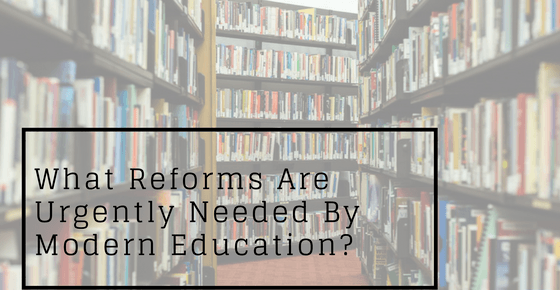What Reforms Are Urgently Needed By Modern Education?
 When we are born, we want to eat the world. Our curiosity is insatiable, and we need to know every single detail about every single thing we stumble upon. Fast-forward twelve years or less. That innate curiosity is just a fading memory. Whatever ingenuity we have we use only to figure out the best way to play truant.
When we are born, we want to eat the world. Our curiosity is insatiable, and we need to know every single detail about every single thing we stumble upon. Fast-forward twelve years or less. That innate curiosity is just a fading memory. Whatever ingenuity we have we use only to figure out the best way to play truant.
What has happened here? Where has the spirit of enquiry gone? The answer is at the same time counterintuitive and obvious: it was school that has taught us not to care. Education has effectively killed our curiosity.
Granted, this doesn’t describe everyone’s experience, but it’s nonetheless an extremely common occurrence in modern Western society. It’s obvious that the modern system of education is profoundly flawed. It can even be detrimental to the students sometimes. But how to fix it? Or maybe the question should be, can it be fixed at all? Is there something inherently wrong at the core of modern education? Can a few reforms here and there patch it up, or should just tear the house down?
These are important questions with no easy answers. But, if we want the next generations to be able to keep up with the relentless pace of 21st century society, we must something about education.
Let’s first look at the root of the problem. It could be argued that ‘broken’ is not the right word to describe modern education. The right word is ‘old.’
Yes, it sounds like a paradox, but modern education is just too old. It’s outdated and archaic, a legacy system inherited from the Industrial Revolution. This system was designed to cater to the needs of the era – and also by the principles of the Revolution. Long rows of identical, neat desks in front of a drilling instructor, an emphasis on orderliness and standardized texts – it’s the principle of Ford’s assembly line applied to the mass production of cheap but usable professionals.
The societal realities of those times, though, are very different to ours. Back then, technological employment was threatening those who had traditionally made a living with manual labor; mass education was necessary to create bookkeepers, clerks and administrators that could keep the machinery running. Now, though, we’re going through a second Industrial Revolution – only now it’s not menial manual labor that is being threatened, but menial mental labor. The development of AI is making many administrative jobs increasingly irrelevant. And the landscape is bound to change vastly in the next few decades.
According to scholar Cathy Davidson, sixty-five percent entering grade school today will end up working in positions that haven’t even been invented yet. Instead of focusing in this future, modern education insists in treating students as if they were living in the eighteenth century.
Future jobs won’t require raw mental power, mindless number-crunching and mnemotechnics – computers will take care of that. Future jobs will require creativity, individuality and a can-do attitude. Though these values often get lip-service from teachers all over the world, the reality of education inculcates exactly the opposite ideas in children. They’re taught to learn by rote and discard their knowledge as soon as it has been put onto the exam paper. They’re taught, often through fear, not only to respect authority but not to question it.
Reform on education, then, must take place from the root. How to do this, though, is a hard and complex question. There is, however, one immediate concern that could be maiming our children’s prospects: the way education is killing curiosity, creativity and passion.
Let’s look at an obvious case: reading. It’s no secret that children hate reading nowadays. It has already become somewhat of a relic as a form of entertainment, and this is not only because of TV and the Internet – it’s also in great part Shakespeare’s fault.
Now, it’s obvious that Shakespeare, Chaucer, and all the other classic writers taught in English classes are great masters of literature, and that educated people should absolutely know about them. However, the fact is that students don’t really understand Shakespeare’s world, and explaining it to them doesn’t help things. After all, literature is felt viscerally. The result is that children start linking together reading and tedious classes about historical contexts.
How to fix this? By not teaching children literature on itself, but the fact that literature is meant to be enjoyed. Teachers should, on a case-by-case basis, see what interests their students and let them read whatever grips their young minds. What if it’s popular fiction? What if, by literary standards, it’s “trash”? Then at least they’ll be reading out of passion, not of obligation. And passion breeds deeper interests. Students will, once they have a deeper understanding of literature, be attracted to more difficult works, such as Shakespeare.
How to implement this less rigid, more organic way of learning is by no means easy, especially given how students outnumber education professionals. Clearly technology would be a crucial component of this new model. But however we decide to do it, it’s important that we find solutions, and that we find them soon, before we damage the future of the next generation of professionals.